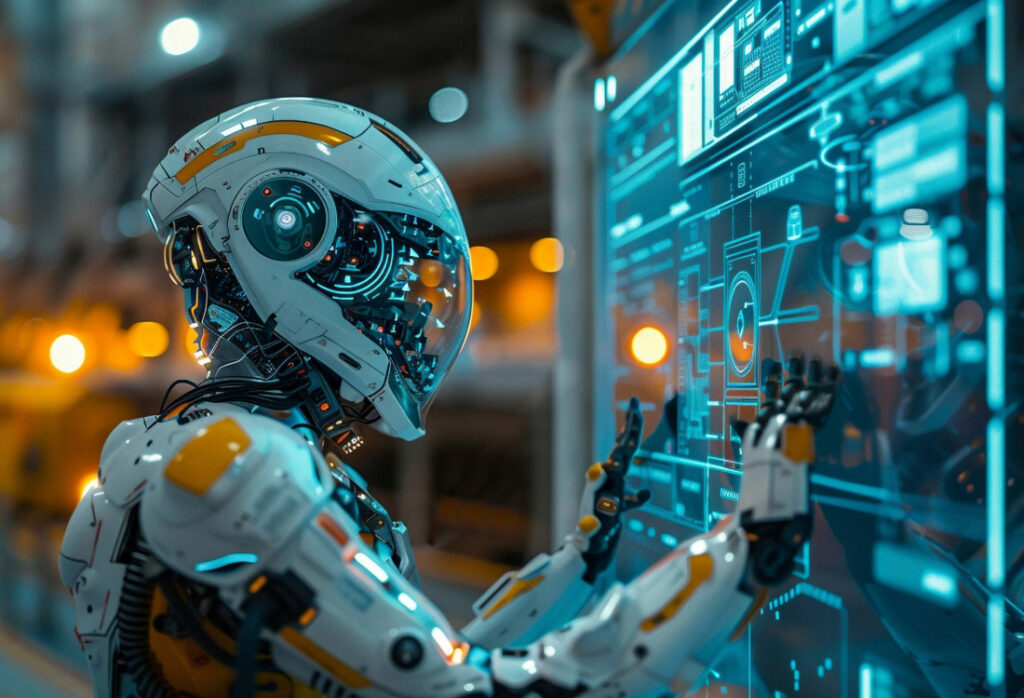Overview of the Page Content
The URL https://www.getnewupdates.com/wp-admin/post.php?post=652&action=edit indicates a specific post within a WordPress administrative panel, suggesting that this section is focused on editing existing content. The content likely discusses critical developments in the Artificial Intelligence Industry Transformation. This transformation reflects how various sectors adapt to and integrate artificial intelligence technologies, influencing operational efficiencies, decision-making processes, and customer experiences.
Importance of Artificial Intelligence in Industry Transformation
Artificial Intelligence (AI) is a driving force behind significant changes across numerous industries. For instance, automotive companies are incorporating AI in manufacturing and for developing autonomous vehicles, resulting in safer and more efficient transport solutions. Additionally, the healthcare sector employs AI for predictive analytics, improving patient outcomes by personalizing treatment plans based on vast amounts of data.
Automotive Industry and AI
The automotive industry’s rapid integration of AI technologies exemplifies the Artificial Intelligence Industry Transformation. With AI systems enhancing autonomous driving capabilities, companies like Tesla and Waymo are leading the charge. These companies utilize machine learning algorithms to process real-time data from vehicle sensors, improving safety and efficiency on the roads.
Healthcare Sector Innovations
In healthcare, AI systems are revolutionizing diagnostics and treatment planning. For example, IBM’s Watson Health analyzes large datasets to support oncologists in developing personalized cancer treatment plans. This application of AI not only accelerates diagnosis but also enhances the precision of treatments, a critical aspect of the ongoing transformation.
Challenges in Implementing AI Technologies
Despite the benefits, organizations face challenges in the implementation of AI. Issues such as data privacy concerns, ethical considerations, and the need for substantial investment in new technologies cannot be overlooked. Data security is particularly pertinent, as the personal data required for AI systems must be protected from breaches. Awareness and compliance with regulations like GDPR have become essential for companies aiming to leverage AI effectively.
Ethical Implications
The ethical implications of AI deployment also present challenges. For instance, biases in algorithms can result in unfair treatment of specific populations. Companies must prioritize fairness and transparency, ensuring that AI systems are designed with inclusivity in mind, to foster trust and acceptance as part of the Artificial Intelligence Industry Transformation.
Future Trends in Artificial Intelligence
Looking ahead, several trends are poised to shape the future of AI within industry transformation. Notably, the rise of explainable AI will enable users to understand how decisions are made by AI systems, thus increasing transparency and trust. Additionally, as quantum computing continues to advance, the potential for breakthroughs in AI capabilities will expand significantly.
Explainable AI (XAI)
Explainable AI (XAI) focuses on creating a transparent environment where users understand AI-driven decisions. This trend addresses concerns about bias and accountability in AI systems, promoting ethical usage. Industries, especially finance and healthcare, are increasingly adopting XAI to foster user trust in their systems.
The Rise of Quantum Computing
Quantum computing presents a game-changing opportunity for the AI sector. Unlike classical computers, quantum machines can process vast amounts of data simultaneously, vastly improving machine learning model training times. As this technology becomes more mainstream, its contribution to the Artificial Intelligence Industry Transformation will likely be profound, enabling complexities that were previously unimaginable.

The Importance of Game Streaming
Understanding Game Streaming
Game streaming refers to the technology that allows users to play video games over the internet without the need for high-end hardware. Players can access a library of games through cloud services, which stream the gameplay directly to their devices. This approach significantly reduces the cost of entering the gaming experience, allowing more people to participate. As internet speeds improve and gaming technology advances, the phenomenon of game streaming continues to reshape the landscape of the gaming industry.
Accessibility and Inclusivity
One of the most crucial benefits of game streaming is its accessibility. With traditional gaming, consumers often need to invest in expensive consoles or gaming PCs. Streaming lowers this barrier, enabling anyone with a stable internet connection to enjoy high-quality gaming experiences. For example, services like Google Stadia and NVIDIA GeForce Now have opened the door for casual gamers who might not own the latest hardware.
Multiplayer Experiences and Community Building
Game streaming fosters community engagement and multiplayer interactions. Through platforms such as Twitch and YouTube Gaming, players can broadcast their gameplay, engage with viewers, and create a shared gaming experience. These platforms allow users to connect with a global audience, form relationships, and cultivate dedicated fan bases. The rise of game streaming has transformed how gamers interact, turning play sessions into social events.
Impact on the Artificial Intelligence Industry Transformation
The Artificial Intelligence Industry Transformation plays a pivotal role in evolving game streaming. AI technologies optimize game performance by enhancing graphical fidelity and reducing latency, making the streaming experience more enjoyable. For instance, AI-driven algorithms can predict player actions, resulting in more personalized gaming experiences. This transformation not only benefits players but also helps developers create more engaging content.
Examples of AI in Game Streaming
Incorporating AI into game streaming services has led to innovative applications. For instance:
- Dynamic Streaming Quality: AI algorithms adjust the streaming quality based on the user’s internet bandwidth in real-time, ensuring a seamless gaming experience.
- Player Personalization: AI analyzes player behavior to recommend games tailored to individual preferences, enhancing user satisfaction and engagement.
- Real-Time Analytics: AI tools provide streamers with insights into viewer engagement, helping to refine content and increase audience retention.
Commercial Opportunities and E-commerce Integration
The growth of game streaming has created numerous commercial opportunities. Brands are leveraging platforms like Twitch for targeted marketing campaigns, integrating e-commerce features that allow viewers to purchase games directly from streams. Moreover, advertising within streams has become a significant revenue source for both content creators and platforms. The game streaming ecosystem is a perfect example of how the Artificial Intelligence Industry Transformation can create new business models in the gaming world.
The Future of Game Streaming
As technology continues to advance, game streaming is expected to become even more prevalent. Innovations in AI, improved cloud infrastructure, and more sophisticated algorithms will further enhance the gaming experience. Crucially, the shift towards streaming will encourage game developers to focus on creating immersive, high-quality content that leverages these technologies. The Artificial Intelligence Industry Transformation will continue to be a key driver in this evolution, influencing how games are designed, streamed, and experienced.

Artificial Intelligence Industry Transformation
Overview of Artificial Intelligence (AI)
Artificial Intelligence has emerged as a pivotal force across industries, driving innovation and transforming traditional business practices. The Artificial Intelligence Industry Transformation is marked by the integration of AI technologies into various sectors, enhancing efficiency, productivity, and decision-making capabilities.
AI in Agriculture
The agricultural sector is witnessing a significant transformation through the application of AI technologies. Innovations such as precision farming, automated irrigation systems, and predictive analytics enable farmers to optimize crop yields and reduce waste. For instance, AI algorithms can analyze soil conditions and weather patterns to recommend the most suitable planting times, leading to enhanced food production and sustainability.
AI in Business Management
In the realm of business management, AI is revolutionizing operational processes. Tools powered by AI assist in streamlining project management, enhancing team collaboration, and providing insightful analytics for strategic planning. For example, AI-driven project management software can analyze past project data to predict timelines, identify potential risks, and allocate resources more effectively.
AI in Data Security
With the rise of cyber threats, AI plays a crucial role in fortifying data security measures. AI technologies are employed to detect anomalies, predict potential breaches, and automate response protocols. Machine learning algorithms continuously learn from new data to strengthen defenses, making organizations better equipped to face cyber threats.
AI in E-Commerce
The e-commerce industry is harnessing AI to personalize customer experiences and optimize supply chain operations. Through sophisticated algorithms, companies can analyze consumer behavior, enabling targeted marketing strategies and personalized recommendations. Notably, AI chatbots enhance customer service by providing instant support, thereby improving customer satisfaction and loyalty.
AI in Education
AI is transforming education by providing custom learning experiences tailored to individual student needs. Adaptive learning platforms analyze student performance and suggest personalized resources, helping educators identify areas for improvement. AI-powered systems also automate administrative tasks, allowing educators to focus more on teaching rather than paperwork.
AI in Finance
In the finance sector, AI is reshaping how financial institutions operate. Algorithms assess credit risks, detect fraudulent activities, and analyze market trends, which aids in making informed investment decisions. Robo-advisors utilize AI to offer personalized financial advice, making wealth management more accessible to a broader audience.
AI in Healthcare
The healthcare industry is experiencing a groundbreaking transformation through AI, enabling predictive analytics for patient outcomes, improving diagnostic accuracy, and optimizing treatment plans. AI systems process vast amounts of medical data, providing healthcare professionals with insights that enhance patient care and streamline operational efficiency.
AI in Marketing
Marketing efforts are becoming more data-driven as AI technologies provide deeper insights into consumer behavior. AI algorithms analyze engagement patterns, enabling marketers to craft more effective campaigns. Predictive analytics help brands identify potential leads and personalize content, enhancing overall return on investment.
AI in Transportation and Logistics
The transportation and logistics sector is leveraging AI to optimize routing, enhance supply chain visibility, and improve delivery times. Smart logistics platforms utilize real-time data to manage inventory effectively, anticipate delays, and streamline operations. These innovations not only reduce costs but also enhance customer satisfaction through timely deliveries.
Economic Impact of AI
The economic implications of AI are profound, as it is projected to contribute significantly to global GDP growth. As industries adopt AI solutions, they can expect increased efficiency and cost savings, leading to higher productivity levels. However, the transition also requires workforce reskilling to meet the demands of AI-driven roles.
Ethical and Societal Implications of AI
While the Artificial Intelligence Industry Transformation brings numerous benefits, it also raises ethical and societal concerns. Issues such as data privacy, algorithmic bias, and job displacement warrant careful consideration. Stakeholders must strive to develop ethical guidelines and frameworks to address these challenges responsibly.
Future of AI
The future of AI holds immense potential with advancements such as quantum computing and improved machine learning algorithms on the horizon. As these technologies evolve, the possible applications of AI will expand, providing even greater opportunities for innovation across industries.
Opportunities and Risks of AI
While the transformation brought about by AI presents numerous opportunities, it is crucial to acknowledge and mitigate associated risks. Organizations must invest in robust security measures, ethical AI practices, and continuous workforce training to harness the full potential of AI while ensuring sustainable growth and development.











